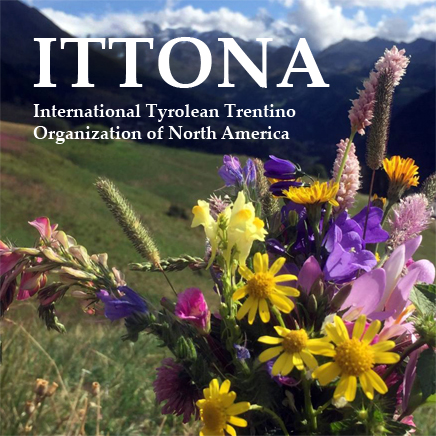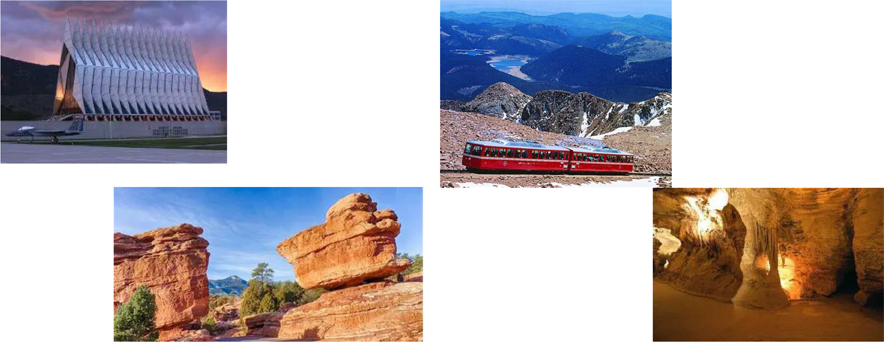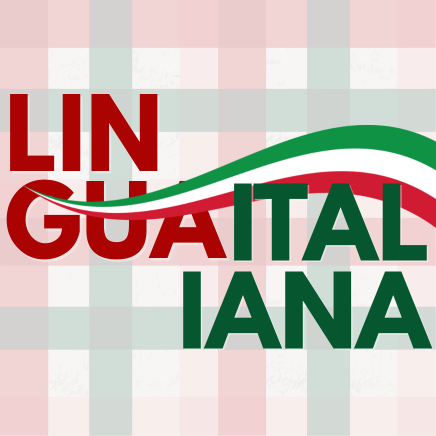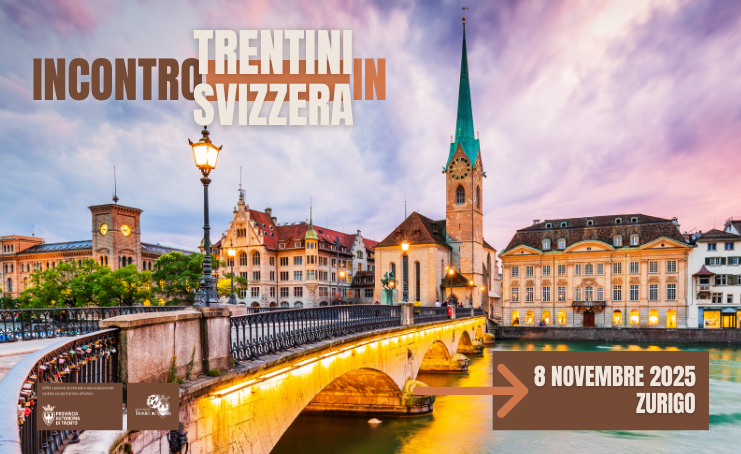From the Dolomites… To the Rocky Mountains!
The Tirolesi Trentini del Colorado Club Presents:
The 26th Ittona Convention in Denver, Colorado
October 8-12, 2026
Pre-Convention Excursion: October 4-8, 2026
These tours are local and hope to acclimate you to the higher altitude. We are a “Mile High” in Denver (5,280 feet above sea level).
Tips to avoid altitude sickness… Drink plenty of water. Speak with your private physician about getting a prescription for Acetazolamide (altitude sickness pills). Bring a canister of Pure Oxygen, especially for any trips to higher elevations or strenuous walking/hiking, etc...
PROGRAM:
- Sunday, October 4 - Light Rail to Downtown Denver for a Guided Walking Tour of the area. Tour of the History Colorado Museum, Mint, State Capitol. Enjoy lunch on your own at one of many restaurants to choose from.
- Monday, October 5 - Spend the day at the Colorado Museum of Nature and Science and then head over to the Denver Zoo. Lunch on your own at either location.
- Tuesday, October 6 - Early departure to Colorado Springs to see the Air Force Academy Chapel and grounds, Garden of the Gods, take the Cog Rail to Pikes Peak, Admission to the Cave of the Winds. Lunch on own.
- Wednesday, October 7 - Lunch at Balistreri Winery with a free morning and afternoon/evening... Buon Appetito!
- Thursday, October 8 - Free day until registration starts. Hope you’ve had a lovely time exploring Denver and parts of Colorado!
CONVENTION: October 8-12, 2026
- Thursday, October 8
12 - 4 pm President’s Meeting (Sheraton Denver West Hotel | 360 Union Boulevard | Lakewood, CO 80228)
4 - 9 pm Registration/Check-in (Sons & Daughters of Italy Denver Lodge Hall | 5925 W. 32nd Avenue | Wheat Ridge, CO 80212)
Light Meal, Bocce, Socializing - Friday, October 9
9 am - 5 pm Registration/Check-In (Sheraton Denver West Hotel)
9 am - 5 pm Free day on your own or full day excursions - 3 to choose from:
A) Estes Park/Rocky Mountain National Park
B) Red Rocks, Buffalo Bill’s Grave/Overlook, Coors Brewery Tour
C) Central City Cemetery, Gold Mine Tour, with a stop at a casino in Blackhawk
6 pm Supper & Entertainment (Sons & Daughters of Italy Denver Lodge Hall) - Saturday, October 10
9 am - 1 pm Convention Conference (Sheraton Denver West Hotel)
Afternoon Free
6 pm - 11 pm Gala dinner and dancing in the hotel ballroom - Sunday, October 11
9:30 am motorcoach departures to Mother Cabrini Shrine
10 am Mass
11 am - 5 pm Polenta Picnic, Music, Camaraderie - Monday, October 12
Choice of returning home or extending your stay and traveling on your own in Colorado and the surrounding areas
Signing up for our Post-Convention Tour
Post-Convention Tour: October 12-17, 2026 (*)
- Monday, October 12
Depart from the Sheraton Denver West Hotel in Lakewood by motorcoach to Pueblo to experience the Christopher
Columbus Celebration at the Monument in town, followed by lunch. We’re off to the Royal Gorge (just over an hour). Enjoy some time exploring this magnificent canyon! We’ll overnight in Salida (1.5- hour drive). - Tuesday, October 13
We’ll make our way by motorcoach to Durango, about 4 hours, through the Rio Grande National Forest. Upon arrival, we’ll stop for lunch. Fall Foliage may still be close to its peak. Enjoy your free afternoon to explore this lovely town in Southwest Colorado. We’ll overnight in Durango. - Wednesday, October 14
Train from Durango to Silverton this morning on the famous Narrow Gauge Railroad, about 3,5 hours.
Upon arrival in Silverton, we'll have lunch and then the motorcoach will take us to the Trentino Memorial.
Overnight in Silverton. - Thursday, October 15
Early departure by motorcoach through the Colorado National Monument (about 3 hours) to see some of the most magical scenery.
We'll stop for lunch in Glenwood Springs and then have some free time for a stroll through town or an afternoon swim at the famous Hot Spring Resort, supper, and an overnight stay. - Friday, October 16
Enjoy the morning exploring the town of Glenwood Springs on your own. Mid-afternoon motorcoach back to the Sheraton Denver West Hotel for an overnight stay to end your tour of Colorado. - Saturday, October 17
Make your way to DIA for your return flights home, with lovely memories that you have made in Colorful Colorado, as we celebrate our 150th birthday!
(*) Post Convention package includes:
- Transportation by motorcoach and train throughout tour
- 5 night accommodations including: breakfast daily and taxes/fees, Meals as stated, Tour guide and admissions as listed
- Final night will be in Denver at the end of the tour prior to departing the following day.
Thank you for joining us and hope to see you again real soon!
Safe Travels!
The Tirolesi Trentini del Colorado Club 2026 Convention Committee
Download the slide show:
L’Associazione Trentini nel Mondo e l’Unione delle Famiglie Trentine all’Estero APS, con il sostegno finanziario della Provincia Autonoma di Trento, promuovono, nell’ambito delle loro attività culturali, un progetto dedicato ai discendenti degli emigrati trentini residenti all’estero.
Bando per l’assegnazione di n. 12 posti
riservati a trentini residenti all’estero
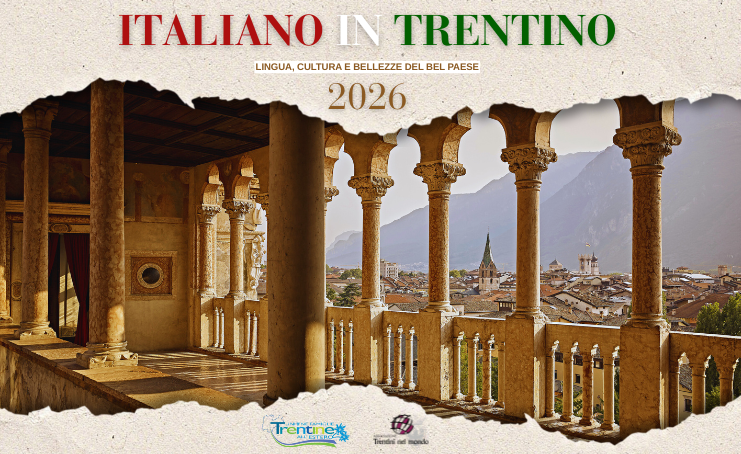
OGGETTO
È indetta per l‘anno 2026 una selezione per l’assegnazione di 12 posti, riservati a discendenti di emigrati trentini, residenti all’estero, per la frequenza di un corso residenziale di lingua e cultura italiana/trentina della durata di 3 settimane dal 02/03/2026 al 20/03/2026.
Il corso si svolgerà in Trentino e prevede n.60 ore di insegnamento linguistico, due escursioni di una giornata in Trentino, 2 laboratori di approfondimento a settimana, possibilità di partecipare ad attività formative in ambito professionale.
OBIETTIVI DEL CORSO
- Consolidamento delle competenze linguistiche di base anche con la possibilità di sostenere successivamente l’esame per una certificazione riconosciuta.
- Approfondire la conoscenza del territorio, della cultura e delle opportunità offerte dal Trentino.
BENEFICI OFFERTI
I partecipanti selezionati avranno accesso a:
- Corso di lingua italiana di livello B1 della durata di 60 ore con esame finale e attestato. Le lezioni si terranno in orario mattutino, 4 ore al giorno dal lunedì al venerdì;
- Materiali didattici;
- Alloggio in camera doppia presso struttura convenzionata dal giorno 01/03/2026 al giorno 21/03/2026 (21 notti);
- Pasto di mezzogiorno nei giorni di frequenza del corso (da lunedì a venerdì);
- Due escursioni in territorio trentino della durata di una giornata con pasto incluso nel fine settimana;
- Sei attività pomeridiane di approfondimento (due a settimana) su temi di cultura trentina e italiana;
- Possibilità di partecipare a un percorso formativo in ambito professionale.
INOLTRE
- Rimborso parziale delle spese del volo aereo nella misura del 50% fino a un massimo di 900,00 Euro. Per ottenere il rimborso il biglietto dovrà essere acquistato entro il 20/12/2025;
- Rimborso assicurazione sanitaria;
- Rimborso del costo dell’esame di certificazione A/B sostenuto entro la fine del 2026 (solo in caso di superamento).
A CARICO DEI PARTECIPANTI
Sono a carico dei partecipanti:
- Viaggio dalla propria residenza alla sede del corso (Trento) – salvo il rimborso parziale del costo del volo;
- Pasti oltre a quelli indicati;
- Spostamenti tra l’alloggio in Trentino e la sede del corso e delle attività;
- Alloggio in strutture diverse da quella convenzionata;
- Ogni variazione rispetto alla proposta di alloggio offerta dagli organizzatori del corso;
- Tutti i costi per eventuali accompagnatori. L’alloggio per eventuali accompagnatori non è garantito dall’organizzazione. Inoltre, chi condivide la camera con un accompagnatore non partecipante al corso sarà assimilato a un partecipante in camera singola e dovrà pagare anche il supplemento eventualmente previsto per chi alloggia in camera singola;
- Tutto quanto non specificato nella voce “benefici offerti”
BENEFICIARI
Possono presentare domanda per partecipare al corso:
- i discendenti di emigrati trentini, residenti all’estero, che alla data di presentazione della domanda abbiano già compiuto i 18 anni di età;
È inoltre richiesta una conoscenza di base della lingua italiana a livello almeno A2 ovvero:
- comprendere frasi ed espressioni comuni su argomenti familiari, comprese informazioni personali e familiari di base, acquisti, luoghi di interesse e lavoro
- comunicare in situazioni semplici e quotidiane che richiedono solo scambi di informazioni semplici e dirette su argomenti familiari
- descrivere aspetti del passato, dell’ambiente e questioni relative ai loro bisogni immediati, utilizzando un linguaggio semplice.
PRESENTAZIONE DELLA DOMANDA
La domanda, dovrà essere presentata all’Associazione Trentini nel Mondo utilizzando i moduli allegati:
- modulo di iscrizione con firma dell’autorizzazione per la privacy
- modulo genealogia trentina
- copia di un documento di identità
- copia di attestato di frequenza di corsi di italiano di livello A1/A2 (facoltativo)
- Certificato medico sullo Stato di Salute: dichiara di godere di buona salute fisica e mentale e di non avere disturbi o condizioni che possano precludere la partecipazione all'attività.
La richiesta, completa di Modulo di Iscrizione, Genealogia, Certificato Medico e Documento va inviata entro il 21 novembre 2025.
La domanda deve essere inviata via posta elettronica all’indirizzo:
Questo indirizzo email è protetto dagli spambots. È necessario abilitare JavaScript per vederlo.
Entro il 7 dicembre l´Associazione Trentini nel Mondo e l’Unione delle Famiglie Trentine all’Estero comunicheranno i nomi dei selezionati.
CRITERI
La selezione sarà effettuata da Associazione Trentini nel mondo e Unione Famiglie Trentine all’Estero con i seguenti criteri preferenziali:
- Età, con preferenza per i più giovani
- Attestato di conoscenza della lingua italiana di livello A1/A2
- Dichiarazione di appartenenza a Circolo / Famiglia Trentina
In caso di parità di condizioni si tiene in considerazione l’ordine di iscrizione.
In caso di membri di uno stesso nucleo familiare la partecipazione viene consentita a un solo componente, secondo l’ordine di priorità sopra descritto. In caso di parità di condizioni si attribuisce al più giovane dei componenti. Gli altri componenti verranno presi in considerazione esclusivamente in caso di posti non assegnati ad altri richiedenti.
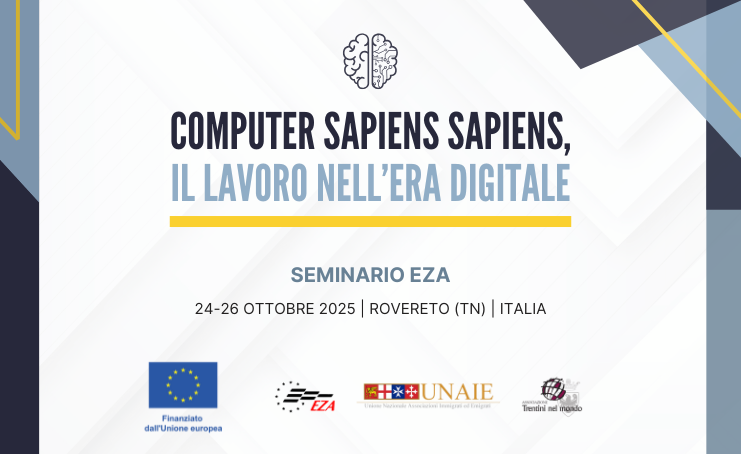
Seminario EZA-UNAIE 2025: "Computer Sapiens Sapiens, il lavoro nell'era digitale", Rovereto (Trentino), 24-26 ottobre 2025
Qui potete scaricare i materiali dei relatori intervenuti durante le sessioni, per consultazione e approfondimento. Vi invitiamo a rispettare i diritti d’autore e l’utilizzo consentito.
Per qualsiasi informazione aggiuntiva vi invitiamo a mettervi in contatto direttamente con la nostra Associazione all'indirizzo: Questo indirizzo email è protetto dagli spambots. È necessario abilitare JavaScript per vederlo.
EZA-UNAIE 2025 Seminar: "Computer Sapiens Sapiens, work in the digital age", Rovereto (Trentino, Italy), 24th-26th October 2025
Here you can download the materials presented by the speakers during the sessions for consultation and further study. We invite you to respect copyright and permitted use.
For any additional information, please contact our Association at: Questo indirizzo email è protetto dagli spambots. È necessario abilitare JavaScript per vederlo.
L’impegno dell’Associazione Trentini nel Mondo per la lingua italiana
L’Associazione Trentini nel Mondo è da decenni un punto di riferimento per i discendenti dei trentini emigrati all’estero. Tra le sue molteplici attività, un ruolo importante è riservato alla promozione della lingua italiana, considerata non solo un veicolo di comunicazione, ma anche un ponte tra generazioni e culture.
Le principali iniziative che l’Associazione porta avanti in questo ambito:
Formazione linguistica per professori d’italiano
- l’Associazione promuove la formazione continua degli insegnanti di lingua italiana attivi nei Circoli Trentini all’estero. Gli incontri mirano a rafforzare le competenze didattiche e a favorire lo scambio di buone pratiche tra insegnanti di italiano. Questi incontri si svolgono principalmente in: Argentina, Brasile e Uruguay
- L’Associazione bandisce borse di studio per corsi universitari di lingua italiana, come ad esempio la “Diplomatura en Formación en Lengua Italiana” presso l’Università del Salvador di Buenos Aires. Queste borse sono rivolte a discendenti di emigrati trentini e insegnanti di italiano attivi nei Circoli Trentini all’estero. L’obiettivo è fornire una formazione accademica solida che permetta di insegnare e diffondere la lingua italiana nelle comunità locali. Link alla pagina dedicata
Progetti scolastici nei Paesi dell’emigrazione
In Uruguay, dal 2023 l’Associazione ha avviato il progetto “Introduzione alla lingua italiana” in alcune scuole pubbliche del paese, con corsi integrati nel programma scolastico per bambini tra i 10 e i 12 anni. Il progetto è sostenuto dal Ministero degli Affari Esteri italiano, ANEP (Amministrazione Nazionale di Educazione Pubblica) ed altre associazioni italiane dell'Uruguay e mira a far conoscere e amare l’italiano fin dalla giovane età. Link alla pagina dedicata
Corsi online e collaborazioni universitarie
In collaborazione con il consorzio universitario ICoN (Italian Culture on the Net), l’Associazione promuove ogni anno borse per corsi online di lingua e cultura italiana, accessibili a studenti di origine trentina in tutto il mondo. Questi corsi rappresentano un’opportunità flessibile per chi desidera mantenere un legame con le proprie radici linguistiche anche a distanza.
Eventi culturali e Settimana della Lingua Italiana
L’Associazione partecipa attivamente alla Settimana della Lingua Italiana nel Mondo, anche attraverso i Circoli Trentini all’estero, organizzando tavole rotonde, incontri e testimonianze che raccontano l’esperienza linguistica dei trentini all’estero. Questi eventi celebrano l’italiano come lingua di identità, memoria e dialogo interculturale. Link al video della tavola rotonda: "Lingua italiana oltre i confini: storie e voci dai trentini nel mondo - Evento 14.10.2025"
Una rete globale per la lingua italiana
Attraverso i Circoli Trentini presenti in numerosi Paesi, l’Associazione crea una rete viva e dinamica che organizza corsi di italiano per adulti e bambini.
L’Associazione Trentini nel Mondo dimostra che la lingua italiana non è solo un’eredità da custodire, ma una risorsa viva da condividere e rinnovare ogni giorno, ovunque nel mondo.
L'Associazione Trentini nel mondo organizza l'incontro "Trentini in Svizzera" rivolto ai trentini residenti in Svizzera,
si terrà a Zurigo nel pomeriggio di sabato 8 novembre 2025







